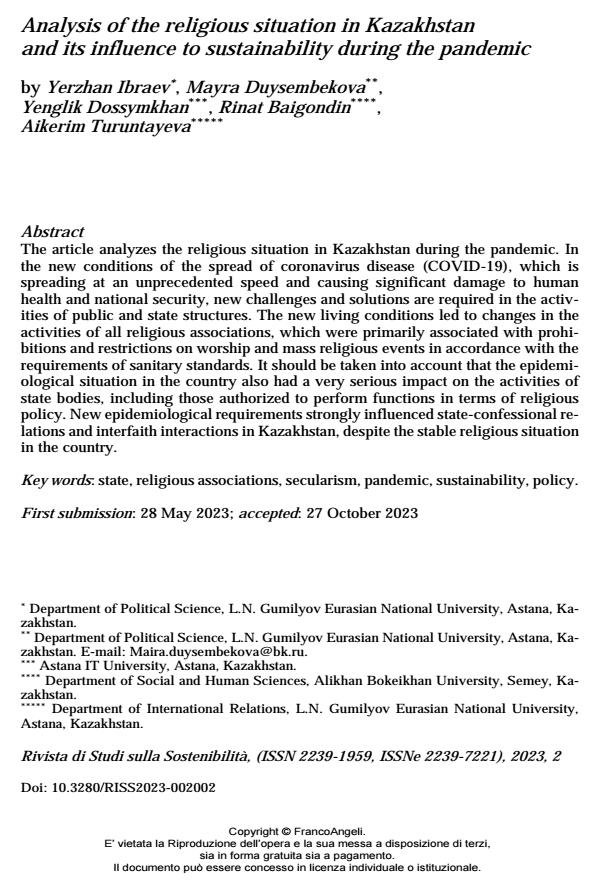Analysis of the religious situation in Kazakhstan and its influence to sustainability during the pandemic
Journal title RIVISTA DI STUDI SULLA SOSTENIBILITA'
Author/s Yerzhan Ibraev, Mayra Duysembekova, Yenglik Dossymkhan, Rinat Baigondin, Aikerim Turuntayeva
Publishing Year 2024 Issue 2023/2
Language English Pages 18 P. 11-28 File size 101 KB
DOI 10.3280/RISS2023-002002
DOI is like a bar code for intellectual property: to have more infomation
click here
Below, you can see the article first page
If you want to buy this article in PDF format, you can do it, following the instructions to buy download credits

FrancoAngeli is member of Publishers International Linking Association, Inc (PILA), a not-for-profit association which run the CrossRef service enabling links to and from online scholarly content.
The article analyzes the religious situation in Kazakhstan during the pandemic. In the new conditions of the spread of coronavirus disease (COVID-19), which is spreading at an unprecedented speed and causing significant damage to human health and national security, new challenges and solutions are required in the activities of public and state structures. The new living conditions led to changes in the activities of all religious associations, which were primarily associated with prohi- bitions and restrictions on worship and mass religious events in accordance with the requirements of sanitary standards. It should be taken into account that the epidemiological situation in the country also had a very serious impact on the activities of state bodies, including those authorized to perform functions in terms of religious policy. New epidemiological requirements strongly influenced state-confessional re- lations and interfaith interactions in Kazakhstan, despite the stable religious situation in the country.
Keywords: state, religious associations, secularism, pandemic, sustainability, policy
- Agbogun R.J.A. (2019). Role of religion in human capital development: Understand- ing employee’s morality in workplace in developing nations. South Asian Re- search Journal of Humanities & Social Sciences, 1(4), 369-374.
- Ali M., Egbetokun A. & Memon M. H. (2018). Human capital, social capabilities and economic growth. Economies, 6(1), 2.
- Bachmann-Medick D. (2017). Cultural turns: A matter of management?. In W. Küpers, S. Sonnenburg, & M. Zierold (Eds.). ReThinking management (pp. 31- 55). Springer. DOI: 10.1007/978-3-658-16983-1_2
- Barro R. J., & McCleary R. (2019). 3. Religion and economic growth. In The Wealth of Religions (pp. 45-66). Princeton University Press. DOI: 10.1515/9780691185798-003
- Biryukova S. S., Vishnevsky A. G., Gimpelson V. E., Demintseva E. B., Denisenko
- M. B., Kapelyushnikov R., Korchagin I. I., Kuzminov Y. I., Mkrtchyan N. V., Ovcharova L. N., Puzanov A. S., Roshchin S. Y., Sinyavskaya O. V., Florinskaya
- Y. F., Frumin I. D., Shishkin S. V., & Yakobson L. I. (2018). How to increase the human capital and its contribution to economic and social development. In
- Y. I. Kuzminov, L. N. Ovcharova, & L. I. Yakobson (Eds.). The XIX April inter- national scientific conference on development problems economies and societies. Higher School of Economics (HSE).
- Caicedo F. V. (2019). The mission: Human capital transmission, economic persis- tence, and culture in South America. The Quarterly Journal of Economics, 134(1), 507-556.
- Diebolt C., & Hippe R. (2019). The long-run impact of human capital on innovation and economic development in the regions of Europe. Applied Economics, 51(5), 542-563. DOI: 10.1080/00036846.2018.1495820
- Díez-Esteban J. M., Farinha J. B., & García-Gómez C. D. (2019). Are religion and culture relevant for corporate risk-taking? International evidence. BRQ Business Research Quarterly, 22(1), 36-55.
- Dzhioeva A. V., & Tavasieva Z. R. (2018). Current challenges of the development of human potential in Russia. In Proceedings of the International Scientific and Practical Conference: Human capital as a factor in the innovative development of society (pp. 57-61). Omega Science.
- Efimova V. S., Lapteva A. V., & Mikhailova E. I. (2016). The concept of human capital – The need for an interdisciplinary synthesis. Journal of Siberian Federal University. Humanities & Social Sciences, 11(9), 2664-2680. DOI: 10.17516/1997-1370-2016-9-11-2664-2680
- Farooq Q., Hao Y., & Liu X. (2019). Understanding corporate social responsibility with cross‐cultural differences: A deeper look at religiosity. Corporate Social Responsibility & Environmental Management, 26(4), 965-971.
- Friedman B. M. (2021). Religion and the rise of capitalism. Knopf.
- Guler A. D., & Ozer-Imer I. (2019). At the crossroads of history and theory: Weber, Schumpeter and economic sociology. Panoeconomicus, 66(4), 465-485. DOI: 10.2298/PAN160531006G
Yerzhan Ibraev, Mayra Duysembekova, Yenglik Dossymkhan, Rinat Baigondin, Aikerim Turuntayeva, Analysis of the religious situation in Kazakhstan and its influence to sustainability during the pandemic in "RIVISTA DI STUDI SULLA SOSTENIBILITA'" 2/2023, pp 11-28, DOI: 10.3280/RISS2023-002002